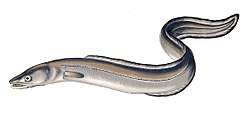Snipe eel
Snipe eels are a family, Nemichthyidae, of eels that consists of nine species in three genera. They are pelagic fishes, found in every ocean, mostly at depths of 300–600 m but sometimes as deep as 4000 m. Depending on the species, adults may reach 1–2 m (39–79 in) in length, yet they weigh only 80-400 g (a few ounces to a pound). They are distinguished by their very slender jaws that separate toward the tips as the upper jaw curves upward. The jaws appear similar to the beak of the bird called the snipe. Snipe eels are oviparous, and the juveniles, called Leptocephali (meaning small head), do not resemble the adults but have oval, leaf-shaped and transparent bodies. Different species of snipe eel have different shapes, sizes and colors. The similarly named bobtail snipe eel is actually in a different family and represented by two species, the black Cyema atrum and the bright red Neocyema erythrosoma.
| Snipe eels | |
|---|---|
 | |
| Avocet snipe eel | |
| Scientific classification | |
| Kingdom: | Animalia |
| Phylum: | Chordata |
| Class: | Actinopterygii |
| Order: | Anguilliformes |
| Suborder: | Anguilloidei |
| Family: | Nemichthyidae |
| Genera | |
|
See table | |
Genera and species
There are nine species in three genera:[1]
| Snipe eels (family Nemichthyidae) | ||||||||||||
|---|---|---|---|---|---|---|---|---|---|---|---|---|
| genera | image | scientific name | common name | max length (cm) |
max weight (kg) |
max age (years) |
dorsal rays |
anal rays |
depth (m) |
Fish Base |
ITIS | IUCN status |
| Avocettina |  |
Avocettina acuticeps (Regan, 1916) |
Southern snipe eel | 77 | 325–436 | 280–368 | to 2000 | [2] | [3] | Not assessed | ||
| Avocettina bowersii (Garman, 1899) |
92–641 | [4] | [5] | Not assessed | ||||||||
| Avocettina infans (Günther, 1878) |
Avocet snipe eel | 80 | to 350 | 265–270 | 0–4580 | [6] | [7] | Not assessed | ||||
| Avocettina paucipora Nielsen & Smith, 1978 |
55 | 254–297 | 218–257 | [8] | [9] | Not assessed | ||||||
| Labichthys |  |
Labichthys carinatus Gill & Ryder, 1883 |
80 | 0–2000 | [10] | [11] | Not assessed | |||||
| Labichthys yanoi (Mead & Rubinoff, 1966) |
Yano's snipe eel | [12] | [13] | Not assessed | ||||||||
| Nemichthys | Nemichthys curvirostris (Strömman, 1896) |
Boxer snipe eel | 143 | 0–2000 | [14] | [15] | Not assessed | |||||
| Nemichthys larseni Nielsen & Smith, 1978 |
161 | 173–222 | 164–208 | 170–1280 | [16] | [17] | Not assessed | |||||
| Nemichthys scolopaceus Richardson, 1848 |
Slender snipe eel | 130 | ~350 | ~320 | 258–4337 | [18] | [19] | Least Concern | ||||
Characteristics
Snipe eels have the long, slender body typical of eels. They are distinguished by their very slender jaws that separate toward the tips as the upper jaw curves upward and which appear similar to the beak of the bird called the snipe. The vent may be near the throat (as in N. scolopaceus) or further back on the body (as in A. gilli and A. infans). Depending on the species, adults may reach 30-60 inches long, and weigh only a few ounces to a pound. The dorsal fins show wide variation, too. For example, A. gilli has fewer than 280 rays in its dorsal fin, while A. infans has more than 320.
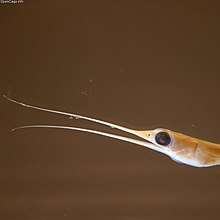
The only food items actually found in the stomachs of snipe eels have been shrimp-like crustaceans, though ichthyologists believe they should be capable of catching and eating small fish and cephalopods also. Since predatory fish often feed on eel larvae, it is presumed by scientists and ichthyologists that they feed on snipe eel larvae as well. It is also thought that larger fish eat adult snipe eels though there is not much direct evidence for this. Scientists have reported a few stories of rockfish vomiting up a snipe eel after being caught and hauled to the surface in a trawl net.
Distribution
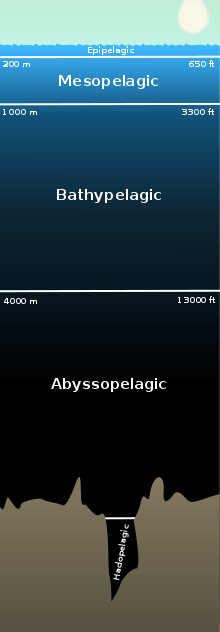
Snipe eels are found in every ocean and generally occupy depths of 300–600 m, though specimens have been caught nearer the surface at night, and storms occasionally result in individuals being stranded on the shore.[20] Larval snipe eels occupy more shallow regions of 60–70 m before descending to metamorphose into adult form.
Reproduction
Based on studies of several species of snipe eel in the Sargasso Sea and off the coast of California, it seems that snipe eels spawn mainly in the spring, but also into early summer. The juvenile forms of eels are generally called leptocephali (meaning “small head”) and do not look like their adult forms. They are flat and transparent, taking forms that may be elongated or closer to the shape of a leaf. They remain in the larval form and near the surface (upper 200 m) for several months before descending to metamorphose. This is similar to other eel species but much longer than most other fish.[21]
Similar fish
The bobtail snipe eels are two species of deep-sea fishes in the family Cyematidae, one only in each of two genera. They are small elongate fishes, growing up to 16 centimeters (6.3 inches) long. They are bathypelagic (deep-water ocean-dwellers) and have been found down to 5,000 meters (16,000 feet). They are found in all oceans. Cyema atrum is black, while Neocyema erythrosoma is bright red.[22]
Sawtooth eels are a family, Serrivomeridae, of eels found in temperate and tropical seas worldwide. Sawtooth eels get their name from the saw-like arrangement of inward-slanting teeth attached to the vomer bone in the roof of the mouth.[22] They are deep water pelagic fish.[23] There are eleven species of sawtooth eels in two genera:[24]
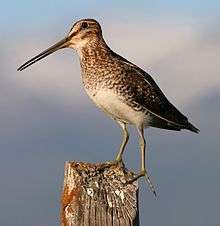 Snipe eels are so named because their jaws resemble the beak of the bird called the snipe
Snipe eels are so named because their jaws resemble the beak of the bird called the snipe.jpg) Most of what is known about snipe eels come from specimens caught by research vessels trawling at midwater depths.
Most of what is known about snipe eels come from specimens caught by research vessels trawling at midwater depths.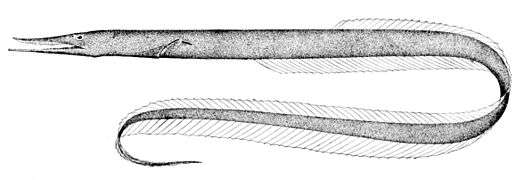 The sawtooth eel is so named because of the saw-like arrangement of its teeth.
The sawtooth eel is so named because of the saw-like arrangement of its teeth.
References
- Froese, Rainer, and Daniel Pauly, eds. (2011). "Nemichthyidae" in FishBase. June 2011 version.
- Froese, Rainer and Pauly, Daniel, eds. (2015). "Avocettina acuticeps" in FishBase. March 2015 version.
- "Avocettina acuticeps". Integrated Taxonomic Information System. Retrieved 1 March 2015.
- Froese, Rainer and Pauly, Daniel, eds. (2015). "Avocettina bowersii" in FishBase. March 2015 version.
- "Avocettina bowersii". Integrated Taxonomic Information System. Retrieved 1 March 2015.
- Froese, Rainer and Pauly, Daniel, eds. (2015). "Avocettina infans" in FishBase. March 2015 version.
- "Avocettina infans". Integrated Taxonomic Information System. Retrieved 1 March 2015.
- Froese, Rainer and Pauly, Daniel, eds. (2015). "Avocettina paucipora" in FishBase. March 2015 version.
- "Avocettina paucipora". Integrated Taxonomic Information System. Retrieved 1 March 2015.
- Froese, Rainer and Pauly, Daniel, eds. (2015). "Labichthys carinatus" in FishBase. March 2015 version.
- "Labichthys carinatus". Integrated Taxonomic Information System. Retrieved 1 March 2015.
- Froese, Rainer and Pauly, Daniel, eds. (2015). "Labichthys yanoi" in FishBase. March 2015 version.
- "Labichthys yanoi". Integrated Taxonomic Information System. Retrieved 1 March 2015.
- Froese, Rainer and Pauly, Daniel, eds. (2015). "Nemichthys curvirostris" in FishBase. March 2015 version.
- "Nemichthys curvirostris". Integrated Taxonomic Information System. Retrieved 1 March 2015.
- Froese, Rainer and Pauly, Daniel, eds. (2015). "Nemichthys larseni" in FishBase. March 2015 version.
- "Nemichthys larseni". Integrated Taxonomic Information System. Retrieved 1 March 2015.
- Froese, Rainer and Pauly, Daniel, eds. (2015). "Nemichthys scolopaceus" in FishBase. March 2015 version.
- "Nemichthys scolopaceus". Integrated Taxonomic Information System. Retrieved 1 March 2015.
- John C. Briggs (1960) Fishes of Worldwide (Circumtropical) Distribution Copeia No. 3, 1960: 171-180; Gokoglu M, Guven O, Balci BA, Colak H, Golani D. First records of Nemichthys scolopaceus and Nemipterus randalli and second record of Apterichthus caecus from Antalya Bay, southern Turkey. Marine Biodiversity Records, 2:e29, Cambridge University Press, 2009
- Wippelhauser GS, Miller MJ, McCleave JD. Evidence of spawning and the larval distributions of snipe eels (family nemichthyidae) in the Sargasso Sea. Bulletin of Marine Science, 59(2):298-309, 1996
- Fitch, JE, Lavenberg RJ. Deep-Water Fishes of California, University of California Press, Berkeley and Los Angeles, California, Library of Congress number 68-64172, pp. 61-65, 1968
- McCosker, John F. (1998). Paxton, J.R.; Eschmeyer, W.N. (eds.). Encyclopedia of Fishes. San Diego: Academic Press. p. 90. ISBN 0-12-547665-5.
- Froese, Rainer, and Daniel Pauly, eds. (2009). "Serrivomeridae" in FishBase. January 2009 version.

